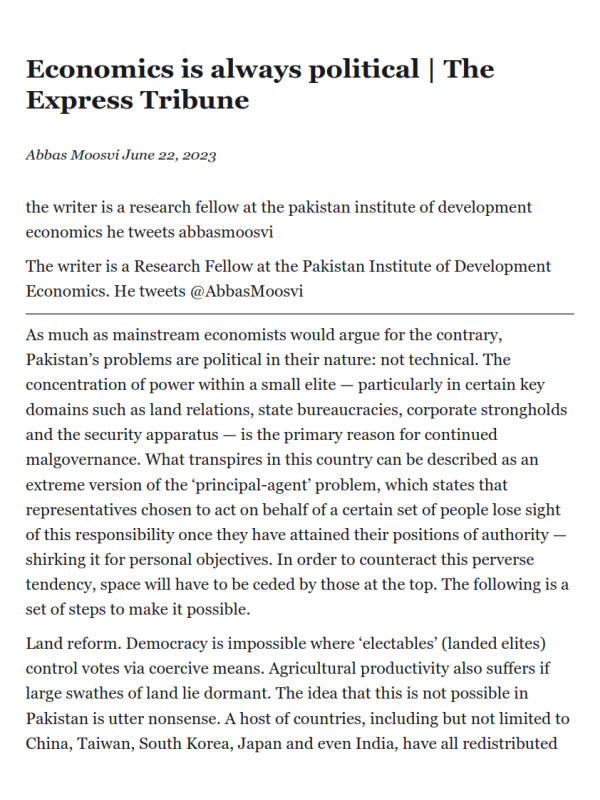
Pakistan Institute of Development Economics
- Home
Our Portals
MenuMenuMenuMenuMenuMenuMenu - ResearchMenuMenuMenuMenuMenuMenuMenu
- Discourse
- The PDR
- Our Researchers
- Academics
- Degree Verification
- Thesis Portal
- Our Portals
Economics is always political
The idea that this is not possible in Pakistan is utter nonsense
As much as mainstream economists would argue for the contrary, Pakistan’s problems are political in their nature: not technical. The concentration of power within a small elite — particularly in certain key domains such as land relations, state bureaucracies, corporate strongholds and the security apparatus — is the primary reason for continued malgovernance. What transpires in this country can be described as an extreme version of the ‘principal-agent’ problem, which states that representatives chosen to act on behalf of a certain set of people lose sight of this responsibility once they have attained their positions of authority — shirking it for personal objectives. In order to counteract this perverse tendency, space will have to be ceded by those at the top. The following is a set of steps to make it possible.
Land reform. Democracy is impossible where ‘electables’ (landed elites) control votes via coercive means. Agricultural productivity also suffers if large swathes of land lie dormant. The idea that this is not possible in Pakistan is utter nonsense. A host of countries, including but not limited to China, Taiwan, South Korea, Japan and even India, have all redistributed land, which in all cases has functioned to instil the incentives to maximise efficient use, in turn leading to greater levels of input for the manufacturing sector which was then able to boost exports to the global market, strengthening currency in the process.
Unionisation. Power differentials between employer and employee adversely impact wages, benefits and working conditions. Mechanisms to allow lower tiers of organisational hierarchies to push for their interests will not only reduce inequalities but also lead to greater levels of efficiency. This is because employees ultimately have a real stake in preserving the interests of their respective companies, on which they are reliant for their incomes. Pakistan’s corporate sector is currently mired by seth culture, with 31 families dominating the executive boards of the KSE-100 as per PIDE. Liberate trade/student unions and farmers’ associations.
Forceful diplomacy. Pakistan’s leadership has always avoided pursuing its interests, particularly in the domains of energy and climate, in the global arena. This is largely due to the fear of upsetting Washington (and its allies) who domestic elites are heavily reliant on for rents via foreign aid. The recent deal with Russia for access to oil, paid for with the Chinese yuan, is a welcome departure from this feeble mindedness. Considering 1/4th of Pakistan’s import bill constitutes fuel, this will have a significant positive impact on the current account and help control inflation rates. Another step in the right direction could be to push for the completion of the TAPI corridor, stalled for decades due to ‘political uncertainty’. Similarly, Pakistan must collaborate with other countries in the Global South to push for climate justice in the form of reparations, an initiative that will lead to mitigation, development funds and lasting regional integration.
Devolution of power. The Pakistani state is currently under the firm control of the security apparatus which functions as a ‘king maker’, controlling virtually all aspects of governance from behind-the-scenes. It is now a fully autonomous, professional industrial complex with a host of profitable businesses under its name — meaning that it is not dependent upon the annual allocation of funds from the federation. This allows it a free hand in dictating policy favourable to its corporate interests, e.g. needless road infrastructure and private housing projects subcontracted to its own, which lead to urban spaces that are only hospitable to elites. Men in uniform must immediately retreat to the barracks, and power devolved down to fiscally and administratively empowered local governments.
Genuine progress is not achieved by the clever tinkering of opportunistic ‘experts’ from international financial institutions (and their co-conspirators), but through democratisation and well thought-out institutional arrangements.
The question of power is, and will always be, front and centre of this process.
Published in The Express Tribune, June 22nd, 2023.



